Older Adults Express Mixed Views on Artificial Intelligence
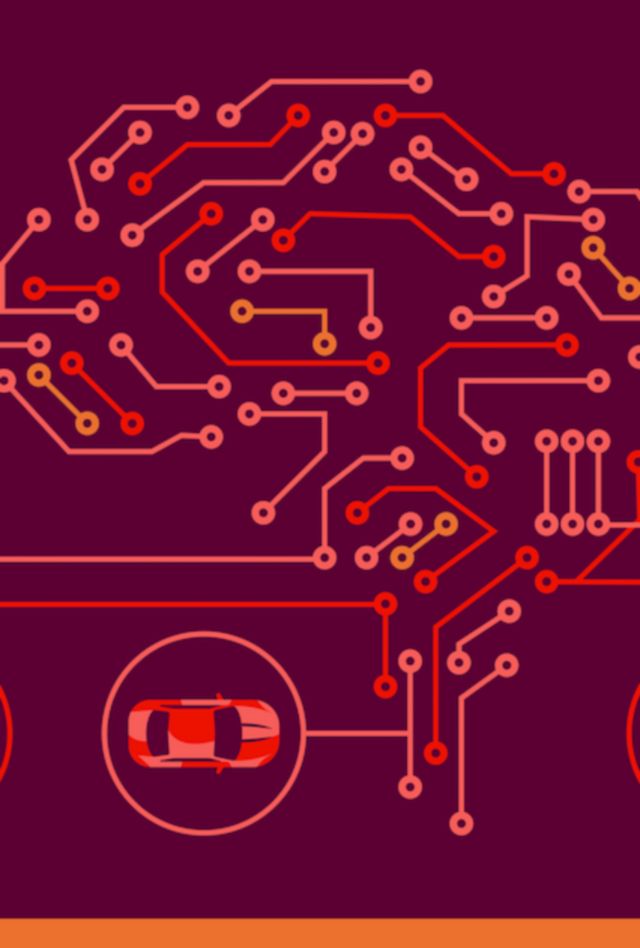
Foresight 50+
Foresight 50+ by AARP and NORC offers deep insight into the views and behaviors of Americans 50 and older.
For inquiries, contact Martha Crowley:
October 2023
With artificial intelligence (AI) spreading into most facets of our lives—from workplaces to health care, entertainment, and transportation—it’s hard not to be exposed to or form opinions about it.
An August Foresight 50+ Omnibus Survey of adults age 50 and older found that only nine percent had not heard of or read about AI. By contrast, 17 percent said that they were very familiar with it.
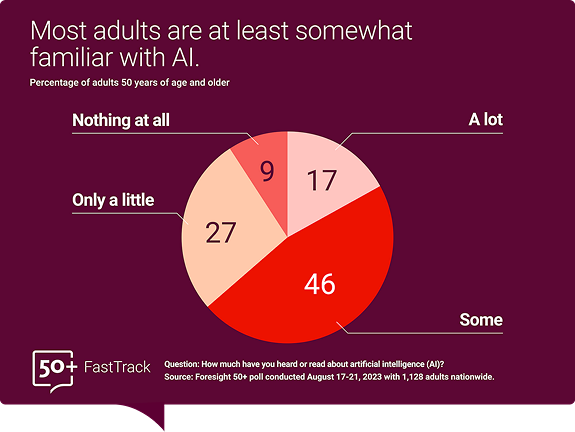
Awareness does not necessarily translate into comfort.
When asked how comfortable they would be with AI being used for specific tasks, a large number were very or somewhat uncomfortable, depending on the undertaking. Nearly three of every four (71 percent) said that AI-driven cars made them very/somewhat uncomfortable, while about half were uneasy with AI providing hiring recommendations (55 percent), giving financial advice (52 percent), or diagnosing medical issues (49 percent). Fewer expressed discomfort with AI providing customer service or determining where police should patrol. Only about a quarter were not okay with AI providing entertainment recommendations.
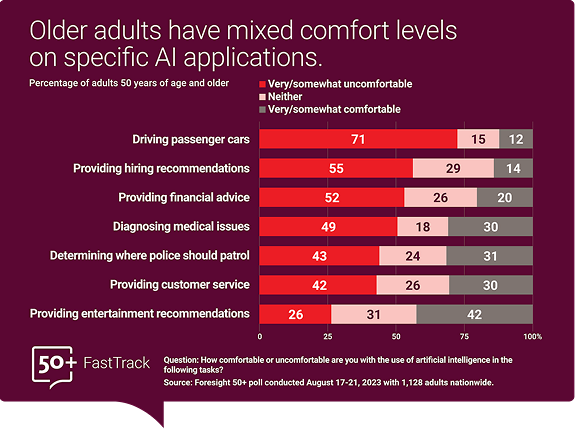
Key racial or ethnic differences arose regarding some of these specific AI uses. Older Black adults were more comfortable using AI for hiring recommendations or financial advice than their white or Hispanic counterparts.
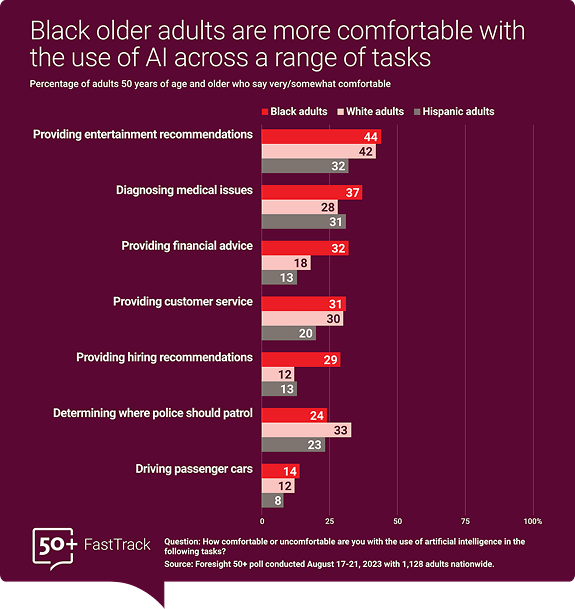
When asked about AI’s impact over the next decade on groups, including racial and ethnic minorities, there was a fair amount of uncertainty and negativity. Only nine percent of respondents thought that AI would have a mostly positive impact on minorities, while 64 percent were unsure of its ramifications.
Of those who viewed AI’s impact darkly, one in three said it could negatively impact college-educated workers, and slightly more (37 percent) feared for those without a college degree.
Interestingly, over a third (35 percent) were optimistic about the possibilities AI presents for people with disabilities.
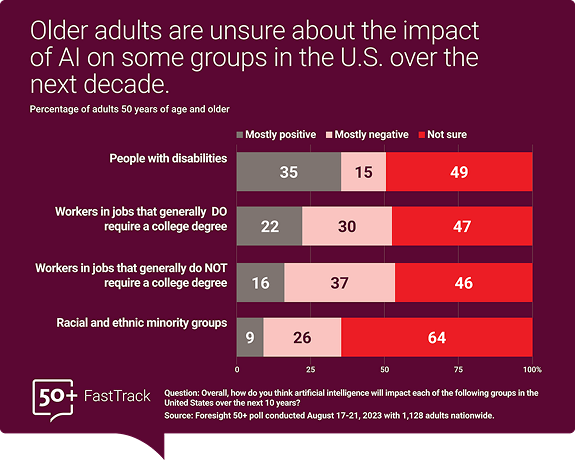
Despite such doubts, at least half or more respondents report interacting with AI-based technologies like online customer service chatbots, home security systems, or devices that track health or sleep. Those 50-59 were more likely than those 60+ to do so.
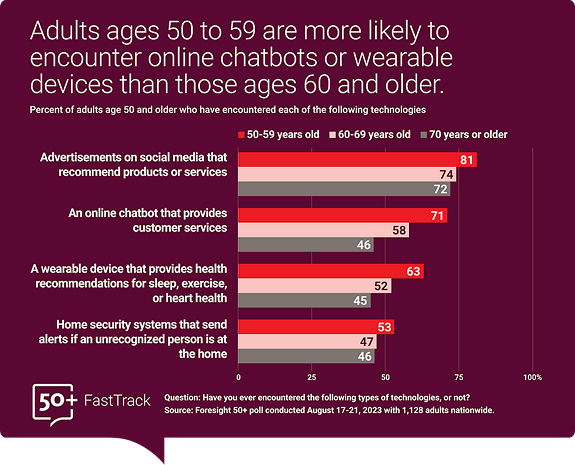
There were no differences across age groups regarding home security systems or social media advertisements.
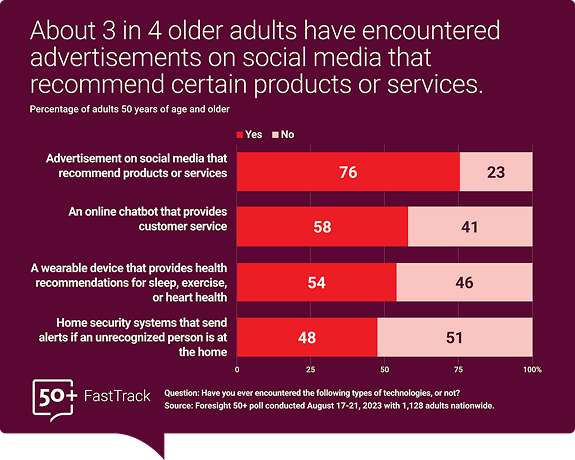
About Foresight 50+ FastTrack
This part of a series of Foresight 50+ Omnibus panel surveys focused on amplifying the voices of people 50 and over. Now more than ever, policymakers and others need this type of scientifically rigorous and readily available data in real time to help them improve policies and programs for an aging population. The Foresight 50+ FastTrack series—a set of periodic insights using the panel—will meet this need by regularly providing key findings and insights on an array of topics that might otherwise be unavailable to the public. The series will also showcase ways your organization can use the panel to answer your questions about the highly influential 50+ demographic.
The large Foresight 50+ panel can oversample a variety of target groups, such as Medicare beneficiaries, grandparents, frequent travelers, and others. Combined with our affordable TrueNorth methodology, Foresight 50+ can incorporate data from lower-quality sample sources without sacrificing statistical reliability to gain insight into even smaller subpopulations, such as veterans, people with food allergies, and those with various health conditions.
For more information on our other surveys or to learn how we can customize a survey of this demographic to your needs, visit the Foresight 50+ website or email Foresight50-bd@norc.org.


